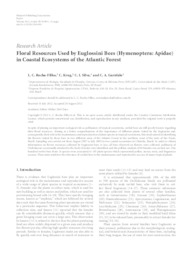Floral resources used by Euglossini bees (Hymenoptera:Apidae) in coastal ecosystems of the Atlantic Forest.
Floral resources used by Euglossini bees (Hymenoptera:Apidae) in coastal ecosystems of the Atlantic Forest.
Author(s): ROCHA-FILHO, L. C.; KRUG, C.; SILVA, C. I.; GARÓFALO, C. A.
Summary: In spite of playing an important ecological role as pollinators of tropical ecosystems, orchid bees are still poorly known regarding their floral resources. Aiming at a better comprehension of the importance of different plants visited by the Euglossini and, consequently, their role in themaintenance and reproduction of plant species in tropical ecosystems, this study aimed at identifying the flowers visited by those bees in two different areas of the Atlantic Forest in the northern coast of the state of S?ao Paulo, Brazil. Sampling was carried out from August 2007 to July 2009 in two coastal ecosystems in Ubatuba, Brazil. In order to obtain information on flower resources collected by Euglossini bees in loco, all bees observed on flowers were collected, pollinaria of Orchidaceae occasionally attached to the body ofmales were identified, and the pollinic analysis of 68 females was carried out. One hundred twelve bees from 14 species were associated to 105 plant species which represented pollen, nectar, resin, and fragrances sources. These data reinforce the relevance of orchid bees to the maintenance and reproductive success of many tropical plants.
Publication year: 2012
Types of publication: Journal article
Unit: Embrapa Western Amazon
Keywords: Atlantic Forest, Euglossini bees
Observation
Some of Embrapa's publications are published as ePub files. To read them, use or download one of the following free software options to your computer or mobile device. Android: Google Play Books; IOS: iBooks; Windows and Linux: Calibre.
Access other publications
Access the Agricultural Research Database (BDPA) to consult Embrapa's full library collection and records.
Visit Embrapa Bookstore to purchase books and other publications sold by Embrapa.

